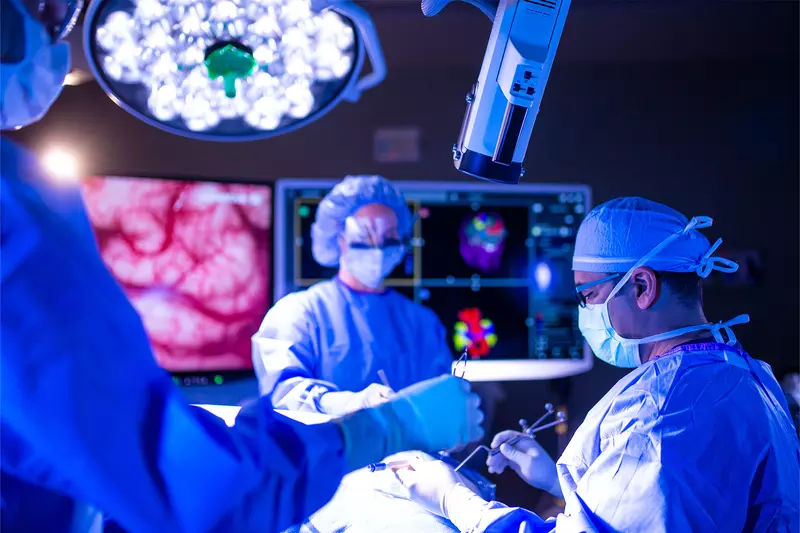
Skull Base Tumor Care You Deserve
A skull base tumor diagnosis comes with a lot of questions, and when you’re facing a health condition you didn’t expect, confidence in your care team is everything. We’re ready with answers.
At the AdventHealth Brain and Spine Institute, we’re here to help you confirm and understand your diagnosis, guide you through treatment and give you a path to recovery that lifts your body, mind and spirit.
Helping You Understand Skull Base Tumors
- What Is a Skull Base Tumor?
-
A skull base tumor is any type of tumor that begins (or extends into) the area behind your eyes and nose that slopes down to the back of the head.
The most common non-cancerous skull base tumors include:
- Acoustic neuroma
- Cholesterol granuloma, epidermoid and dermoid cysts
- Craniopharyngiomas
- Fibro-osseous lesions
- Hemangioma
- Inverting papilloma
- Lipoma
- Paraganglioma
- Schwannomas
Common malignant skull base tumors include:
- Adenocarcinoma
- Adenoid cystic carcinoma
- Esthesioneuroblastoma or olfactory neuroblastoma
- Nasopharyngeal carcinoma
- Non-Hodgkin’s lymphoma
- Squamous cell carcinoma
There are some head and neck tumors that can grow into the skull base, too. These include salivary gland tumors and some skin cancers.
- What Are the Symptoms of Skull Base Tumors?
-
The symptoms of skull base tumors vary based on their size, type and location. The most common skull base tumor symptoms include:
- Balance problems
- Difficulty swallowing
- Dizziness
- Double vision
- Facial pain or numbness
- Facial weakness or paralysis
- Loss of sense of smell
- Lumps on the neck
- Headache
- Hearing loss
- Hoarse voice
- Nasal congestion
- Nosebleeds
- Recurrent sinus problems
- Shortness of breath
- Tinnitus (ringing in the ears)
- Vertigo
- Vision loss
- How Is Skull Cancer Diagnosed?
-
Skull base tumor symptoms can be easily confused with other conditions. But if you’re still experiencing troubling symptoms that aren’t going away, your doctor may want to rule out the presence of a tumor by recommending one or more of these diagnostic tests.
Imaging Tests
Magnetic resonance imaging (MRI) or a computed tomography (CT) scan helps doctors diagnose skull base tumors by identifying the presence, size and location of a tumor.
Biopsy
If your imaging test reveals a suspicious growth, a biopsy can determine whether a tumor is benign or malignant. During the procedure, your surgeon will extract a small sample of cells that are on and around the tumor for a pathologist to analyze. Once a diagnosis is made, your doctor will work with you to create a tailored treatment plan that’s right for you.
Functional Testing
Additional tests might be ordered to help your doctor determine how the tumor is affecting your:
- Balance
- Cognition
- Hearing
- Hormone production
- Memory
- Sense of smell
- Swallowing
- Vision
- Vocal cords
Empowering You With Options for Treatment
Our Institute offers multiple treatment modalities for skull base tumors. We’ll help you decide which is right for you based on the type, size and location of the tumor, as well as how it’s impacting your life.
-
Chemotherapy
Chemotherapy is a cancer treatment that uses a combination of drugs to interfere with cell division and destroy cancer cells.
-
Minimally Invasive Brain Surgery
Our advanced surgical methods require minimal or no incisions, reducing risks and leading to a faster recovery.
-
Radiation Therapy
During radiation therapy, energy similar to X-rays targets only the sick parts of your body, keeping healthy tissue strong and untouched.

Heal With a Team at Your Side
When you’re facing a brain tumor diagnosis, being surrounded by family, friends and caregivers can make all the difference. At the AdventHealth Brain and Spine Institute, you’ll have an experienced, compassionate team guiding the way, and your loved ones at your side. We all want the same thing: to get you back to living your best life.

